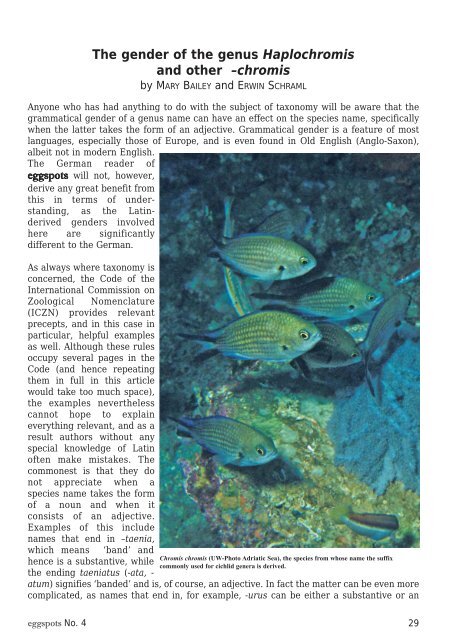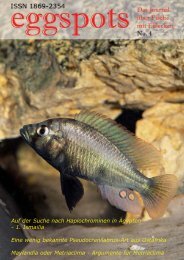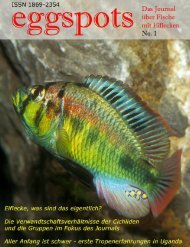Eggspots Elsewhere - Welt der Fische / World of Fishes
Eggspots Elsewhere - Welt der Fische / World of Fishes
Eggspots Elsewhere - Welt der Fische / World of Fishes
You also want an ePaper? Increase the reach of your titles
YUMPU automatically turns print PDFs into web optimized ePapers that Google loves.
Anyone who has had anything to do with the subject <strong>of</strong> taxonomy will be aware that the<br />
grammatical gen<strong>der</strong> <strong>of</strong> a genus name can have an effect on the species name, specifically<br />
when the latter takes the form <strong>of</strong> an adjective. Grammatical gen<strong>der</strong> is a feature <strong>of</strong> most<br />
languages, especially those <strong>of</strong> Europe, and is even found in Old English (Anglo-Saxon),<br />
albeit not in mo<strong>der</strong>n English.<br />
The German rea<strong>der</strong> <strong>of</strong><br />
eggspots will not, however,<br />
<strong>der</strong>ive any great benefit from<br />
this in terms <strong>of</strong> un<strong>der</strong> -<br />
standing, as the Latin<strong>der</strong>ived<br />
gen<strong>der</strong>s involved<br />
here are significantly<br />
different to the German.<br />
As always where taxonomy is<br />
concerned, the Code <strong>of</strong> the<br />
International Commission on<br />
Zoological Nomenclature<br />
(ICZN) provides relevant<br />
precepts, and in this case in<br />
particular, helpful examples<br />
as well. Although these rules<br />
occupy several pages in the<br />
Code (and hence repeating<br />
them in full in this article<br />
would take too much space),<br />
the examples nevertheless<br />
cannot hope to explain<br />
everything relevant, and as a<br />
result authors without any<br />
special knowledge <strong>of</strong> Latin<br />
<strong>of</strong>ten make mistakes. The<br />
commonest is that they do<br />
not appreciate when a<br />
species name takes the form<br />
<strong>of</strong> a noun and when it<br />
consists <strong>of</strong> an adjective.<br />
Examples <strong>of</strong> this include<br />
names that end in –taenia,<br />
which means ‘band’ and<br />
hence is a substantive, while<br />
the ending taeniatus (-ata, -<br />
atum) signifies ‘banded’ and is, <strong>of</strong> course, an adjective. In fact the matter can be even more<br />
complicated, as names that end in, for example, -urus can be either a substantive or an<br />
eggspots No. 4<br />
The gen<strong>der</strong> <strong>of</strong> the genus Haplochromis<br />
and other –chromis<br />
by MARY BAILEY and ERWIN SCHRAML<br />
Chromis chromis (UW-Photo Adriatic Sea), the species from whose name the suffix<br />
commonly used for cichlid genera is <strong>der</strong>ived.<br />
29




